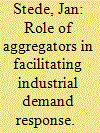| Srl | Item |
| 1 |
ID:
177112


|
|
|
|
|
| Summary/Abstract |
Industrial demand response can play an important part in balancing the intermittent production from a growing share of renewable energies in electricity markets. This paper analyses the role of aggregators – intermediaries between participants and power markets – in facilitating industrial demand response. Based on the results from semi-structured interviews with German demand response aggregators, as well as a wider stakeholder online survey, we examine the role of aggregators in overcoming barriers to industrial demand response. We find that a central role for aggregators is to raise awareness for the potentials of demand response, as well as to support implementation by engaging key actors in industrial companies. Moreover, we develop a taxonomy that helps analyse how the different functional roles of aggregators create economic value. We find that there is considerable heterogeneity in the kind of services that aggregators offer, many of which do create significant economic value. However, some of the functional roles that aggregators currently fill may become obsolete once market barriers to demand response are reduced or knowledge on demand response becomes more diffused.
|
|
|
|
|
|
|
|
|
|
|
|
|
|
|
|
| 2 |
ID:
175238


|
|
|
|
|
| Summary/Abstract |
This paper surveys and assesses the technical and economic features that are crucial in the provision of frequency control services from aggregated household-prosumers. A framework is presented that allows policy makers to accurately assess these services. Furthermore, the role of the service aggregator in the provision from prosumers is outlined, something that highlights the value of the new distributed framework. Also discussed are the key features within the overall context of the design variables in various European countries, which are representative of different synchronous areas. This finding implies that from a regulatory point of view, important efforts are being made to harmonise the different network codes in the investigated countries. Moreover, this research compares the impact of techno-economic design variables on the financial incomes of providing frequency control services. For this purpose, we used a stochastic model of input variables that involves the statistical analysis of time series. A probabilistic method based on Monte Carlo simulation allowed the assessment of the revenues. The outcomes indicate that the RES penetration in each country together with the ratios of the power availability band and of the power availability band activation, and their associated prices are crucial factors that influence the resulting profitability.
|
|
|
|
|
|
|
|
|
|
|
|
|
|
|
|
| 3 |
ID:
166360


|
|
|
|
|
| Summary/Abstract |
Energy storage offers the flexibility needed to integrate renewable generation into electricity systems. One decentralized option is to install battery packs in homes and offices. Yet storage owners might operate their device autonomously to minimize their own electricity costs, but this could be inefficient from a wider electricity system perspective. Using a novel agent-based power system model, ESMA, we explore the economic trade-offs of aggregator-led (centralized) and consumer-led (decentralized) coordination in the UK over the period 2015–2040. We consider the deployment of storage in the domestic, commercial and industrial sectors.
|
|
|
|
|
|
|
|
|
|
|
|
|
|
|
|